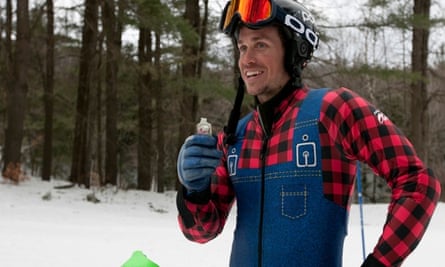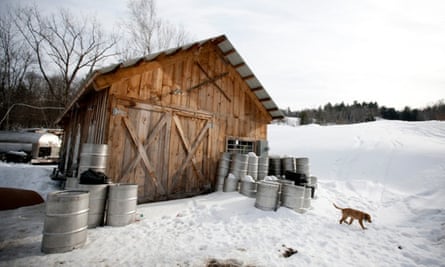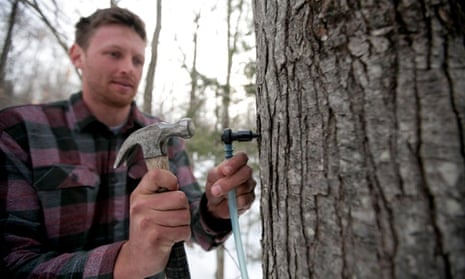Winter is finally lifting across the US north-east. For Vermont, that means an end to a bitterly deep freeze – and the annual start to maple sugaring season.
At Slopeside Syrup, in Richmond, the trees are tapped and the anticipation is palpable. The company began making syrup a few years ago, but this will be its first full season with a new product: UnTapped.
Sold in energy-gel packets with a quick-open top, UnTapped is labeled an “athletic fuel”. According to its nutrition panel though, it contains only one ingredient: “100% Pure Vermont Maple Syrup (That’s it.)”.
Athletics is the latest, and perhaps boldest, frontier for a notoriously sticky substance that has – from hard candy to chicken-wing glaze – slowly attempted to break out of its breakfast table niche. The packet idea began to take shape last year, when the Cochran family connected with professional cyclist Ted King.
“We’re all athletes, we’re all young,” explained Roger Brown, one of the four Cochrans that run Slopeside Syrup. The family is a near dynasty in the ski-racing world, with an Olympic gold medal and numerous national championships to their name. The ski area they own also happens to be surrounded by some 23,000 maple trees, which produce upwards of 7,000 gallons of syrup each year. “So we joined forces and started marketing 1oz, 100-calorie packets of maple syrup,” said Brown.
Patterned as syrup jugs and marketed as a sports supplement, the packets walk the line between novelty item and performance booster. But the company swears by syrup – especially King, who has become their self-proclaimed chief maple syrup proselytizer.

Photograph: Amanda Swinhart for The Guardian
“I like to talk about this, so bear with me,” he warned, before launching into a detailed explanation of why, apart from tasting better (some find it even too sweet), syrup’s low glycemic index, antioxidant levels and simple ingredients have made it his go-to performance booster for years, including on the Tour de France. Tim Kelley, another Cochran cousin, is an elite ski racer and echoes King.
“I’m not the scientist of the group,” he admitted – though he did win the first three races in which he used UnTapped and said it’s his lucky charm. “I just know [that] when I take it, I feel better and have more energy.”
Tim Perkins at the University of Vermont’s Maple Research Center isn’t surprised by the reported jolt. “It’s primarily sugar,” he says, adding that syrup’s other characteristics – such as the high natural mineral content – might make it a preferable alternative to more complex gels.
The Cochran clan is not the only – or even the first – cadre of maple enthusiasts to stumble on this concept. The Federation of Quebec Maple Syrup Producers, which supplies roughly three-quarters of the world’s maple syrup, launched the “Fueled by Nature” initiative in 2012.
“We came up with the idea of giving recipe[s] to athletes,” said Ariane Lavigne, a dietitian and Olympic snowboarder sponsored by the federation. “It’s not just maple syrup.” The website – fittingly, ilovemaple.ca – has a list of sports drinks, energy gels, bars and other snacks designed for various stages of the workout process, all of which incorporate the syrup as an ingredient.
Dr Bob Arnot, a bestselling author on health and nutrition, likes the natural sugars in syrup and sees merit to both the recipe and packet approaches. Physiologically, however, he says there probably isn’t any benefit to using pure maple syrup during exercise lasting less than 45 minutes, though he can imagine it providing a noticeable boost during longer, higher-intensity workouts.
Others are more skeptical.
“I’ve seen zero studies,” said nutritionist Ben Greenfield, voicing concern about the lack of research on the subject. He would like to see more methodical comparisons with other, more widely used carbohydrate combinations like maltodextrin and fructose.

UnTapped’s reliance on anecdotal evidence doesn’t seem to have tamped its appeal though. When the company turned to crowdfunding (people were essentially pre-ordering the product) to get started last summer, it quickly raised $50,000. Well over the $35,000 initial ask, the money allowed for a first-production run of 100,000 units. The stock is already more than half gone.
At the Outdoor Gear Exchange sports shop in nearby Burlington, UnTapped sometimes sits next to GU and Scratch in the sports nutrition section. Other times it can be found in the local foods display. Regardless, it flies off the shelf.
“It probably is our bestselling individual flavor,” said Mike Donohue, the store’s co-owner. He has sold UnTapped to everyone, from medical personnel managing diabetes to holiday shoppers looking for stocking stuffers or people wanting to bring real maple syrup to the diner. And with much larger outlets like LL Bean set to begin carrying the product later this spring, UnTapped doesn’t expect demand to slip anytime soon.
Still, syrup remains on the fringes of the athletic realm. “It’s not very popular, just like honey is not very popular,” said nutritionist Ben Greenfield. Scientific concerns aside, he added: “It’s hard to just take a bottle of maple syrup from your pantry and pour it into a ziplock bag. It’s messy.”
On that front, UnTapped certainly bridges a gap. In fact, the modicum of manageability the Cochrans have brought to such a gooey substance might ultimately be their legacy. “To get off the ground, we needed an anchor use,” said Brown. “[But] there are so many ways that you can use portable maple syrup.” Next up, he says, is a line of maple-based waffle biscuits.
UnTapped is up against high costs ($1.99 a packet), strict syrup supply regulations and a crowded natural foods landscape that could all limit growth. But co-founder and marketing manager Andrew Gardner – himself a former nordic ski coach – says they will continue to push as far as they can.
“We’re at the mercy of how much syrup they make now,” he acknowledged. But the hope is that once the sap starts flowing, this year’s maple season will be sweeter than ever.

Comments (…)
Sign in or create your Guardian account to join the discussion